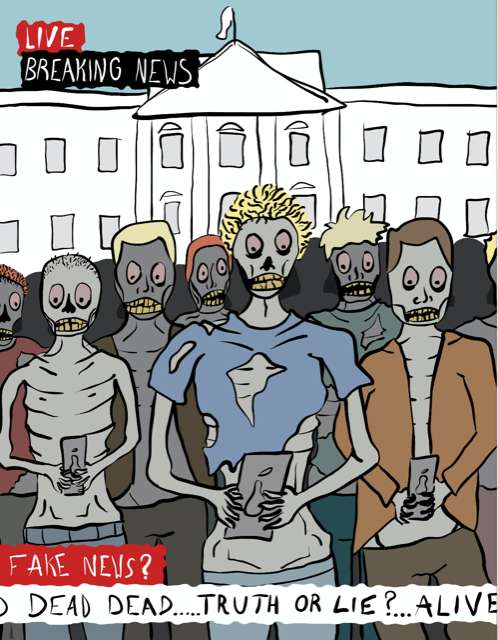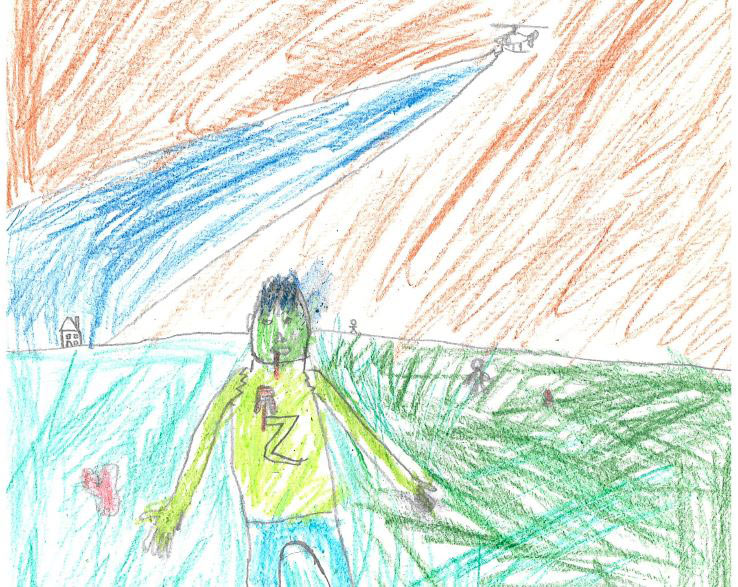The Cultural and Intellectual Climate Committee (CICC) is an all-campus committee of faculty and staff appointed by the Provost. Each year members of the Committee choose a theme to frame a year-long series of lectures, discussions, film screenings, and art exhibits. This theme is meant to promote cultural life on campus and help the campus and Cortland community engage in discussions connected to issues relevant to today's world.
If you are a member of SUNY Cortland's faculty or staff and would like to participate in the CICC, please contact Benjamin Wilson, the committee's chair. If you are member of the student body or the Cortland community and have a suggestion for a speaker or event, please feel free to contact us as well.
2018/2019 Academic Year: Zombies and Surviving the Apocalypse
"A zombie is supposed to be the living dead: people who die and are resurrected, but without their souls. They can take orders, and they're supposed to never be tired, and to do what the master says." Zora Neale Hurston on Zombies.
Each year, the Cultural and Intellectual Climate Committee selects a different intellectual theme for the academic year. Throughout both semesters, there will be a series of campus events related to the chosen topic. Events will include guest lectures, panel discussions, movie screenings, art exhibits, music, and dramatic performances.
This year’s theme is “Zombies and the Apocalypse.” Programming for the 2018-2019 academic year will be developed in conjunction with this year’s common read: A Field Guide to Zombies and Surviving the Apocalypse!.
In this Field Guide you will find an "undead" collection of academic, fictional and artistic works to describe the fears and realities of Zombies and the Apocalypse as a cultural and natural phenomenon. Please submit entries to be included as new chapters or sub-sections for existing chapters in this year’s common read to Benjamin Wilson, and we will add it to the online collection below. As the year progresses, we will highlight current chapters and additions to the volume via email announcements. So please be aware and help us stop the zombie apocalypse by utilizing and adding to these resources to kill undead ideas and survive doom!
View this year's calendar of events.
Zombies and the Apocalypse
For the 2018-2019 academic year, the Cultural and Intellectual Climate Committee plans a year-long multi-disciplinary discussion focused on Zombies and the Apocalypse. Zombies and the Apocalypse provide an entertaining and fictional popular culture space for examining some horrific and terrifying realities. Global climate change, ever growing economic inequality, the future of education, growing tensions across race and class, and issues of public health are but a sampling of some of the topics scholars are investigating by utilizing Zombies and the Apocalypse as descriptive models and metaphor.
By introducing hard and often controversial topics, such as an endless war on terror, from this popular culture perspective, we hope to provoke productive and insightful discussion across a broad range of disciplinary and cross-disciplinary perspectives. We invite you to participate in this and to contribute to the creation of a more lively campus community.
We hope that you will join in building the Field Guide and at scheduled events, and that you also engage the theme through the common read.
A Field Guide to Zombies and Surviving the Apocalypse!
Introduction
Zombies are horrific. They are unthinking, unfeeling creatures driven by intractable appetite. They swarm, overrun, and eat the brains of their human kin. And the zombies are rising...
Zombie accounts on social media exert influence in our elections. Zombie senescent cells in the body do not multiply, and never die; they are thought to be related to premature aging. Smartphones are zombifying entire generations who shamble face-down, eyes glued to their screens. Some argue that the corporatization of education is a plague that turns teaching into a soulless practice focused on producing mindless consumers. Furthermore, in economics zombies take shape in the form of ideas killing creativity and eating up policy space.
How do we recognize and fight back against the zombie menace? For the 2018-2019 academic year, the Cultural and Intellectual Climate Committee has put together a series of chapters for this volume. Zombie Origins, Zombies in Nature and Economics are some of the topics provided to initiate a year-long multi-disciplinary field guide to killing zombies that describes a variety of tools and techniques for waking the apathetic and unresponsive from the horrors of the undead. Please join us for this imaginative and rigorous series of events to help ensure the survival of our species and the planet!
The Field Guide Images: Zombie Graphic Design
Table of Contents
Avoiding Zombie Media Consumption

Chapter 1: Zombie Origins
Chapter 2: Zombies in Nature
Chapter 3: Zombie Economics
Chapter 4: Avoiding a Zombie Diet with our Executive Chef, James Webb
Chapter 5: Zombies in Education
- Are you teaching ‘zombie’ lessons?
- RSA Animate: Changing Education Paradigms
- Do schools kill creativity? with Sir Ken Robinson
Chapter 6: Zombies in Sociology
Chapter 7: Zombies in Public Health
Chapter 8: A Zombie and Apocalypse Poetry Collection
Spring Schedule of Events
Thursday and Friday, February 7 and 8 from 9:30 a.m. to 5 p.m. in the Fowler '52 Grand Entrance Hall, Old Main.
Howard Lindh and the Cortland Writers' Association hosts a Bring Books Back to Life Zombie Book Sale.
Thursday, February 7, 5 p.m. - Jacobus Lounge, Brockway Hall.
Evan Faulkenbury moderates "Was Slavery a Choice? Historians Answer to Kanye West".
Monday, March 3, 5 p.m. - Jacobus Lounge, Brockway Hall.
Is it too late to avert apocalyptic climate change?
Wednesday, March 27, 4:30 p.m. - Sperry 105.
Asma Barlas, Sex and Scripture: What can the Qur'an tell us about male privilege and gender equality?
Thursday, April 4, 4:30 - 6:00 p.m. - Colloquium, Old Main.
Dr. Ulises Mejias of SUNY Oswego "Data Colonialism: Extraction, Dispossession and Capitalism's New Social Order".
Wednesday, April 24, 7:15 p.m. - Sperry 105.
Benjamin Lovett hosts a panel discussion "Zombies in the Classroom and Society".
Thursday, May 9, 5:30 - 6:30 p.m. - Old Main Colloquium, Room 220.
Dowd Gallery presents A Student Exhibition: Digital Illustrations of Zombies and Surviving the Apocalypse. The exhibition will run from May 6 to September 6, 2019.
Fall Events
Friday, October 5, 3 - 5 pm - The Bistro Off Broadway
Chef James Webb “A Cooking Demonstration for Avoiding a Zombie Diet”.
Monday, October 29, 3:30 - 5 p.m. - Jacobus Lounge, Brockway Hall
Dr. Taylor Reid of the Culinary Institute of America "Surviving the Zombie Apocalypse: Wild Plants, Foraging, and the Future of food".
Tuesday, October 30, 5 p.m. - Jacobus Lounge, Brockway Hall.
Heather Bartlett hosts a "Zombie Poetry Reading by Chen Chen".
Wednesday, October 31, 4:30 - 6 p.m. - Colloquium Room 220, Old Main.
Howard Lindh hosts a "Demonstration of zombie make-up application".
Wednesday, October 31, 9 -11 p.m. - Room 106, Sperry Center.
Film Screening: Warm Bodies.
Monday, November 5, 4:30 - 6 p.m. - Jacobus Lounge, Brockway Hall.
Tyler Bradway hosts "The American Smile: A Conversation with Mary Otto, author of Teeth".
Tuesday, November 13, 4:30 - 6 p.m. - Jacobus Lounge, Brockway Hall.
Benjamin Wilson hosts "Capital: An Interdisciplinary Keywords Conversation".
Thursday, November 29, 6 p.m. - Sperry 104.
Film Screening: The Young Marx.
